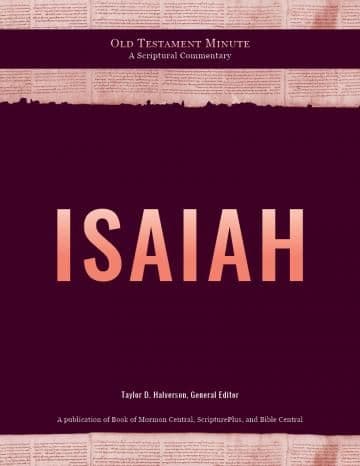Book
66 Chapters

Isaiah 57
After condemning the wicked (see the last section), the Lord promises great blessings to righteous individuals—they will possess the land, meaning the land of their inheritance (57:13), and “inherit” God’s temple (57:13); God will provide them with a smooth path to walk in as they navigate mortality (57:14); and He will revive their souls (57:15), “heal” them (57:18), “restore comforts” for them (57:18), and give them “peace” (57:19). But it is different for the wicked; they will be “like the tossing sea,” continually tossing up “mire and dirt” (57:20). God states, “There is no peace for the wicked” (57:21).
inherit My holy mountain. Righteous individuals will have a right to access God’s temple (the temple is sometimes called a “holy mountain”) and to possess all of the blessings that it provides to them.
Build up the road. (“road” [Hebrew, msilla] is from DSS Isaiah). The command to build is a plural form (evident in the Hebrew). God’s people will join the call to build up the way whereby Israel may return from its long spiritual and physical dispersion. lift up the stumbling block from My people’s way. “Stumbling block” refers to life’s obstacles and impediments (physical and spiritual). The righteous are to help lift the stumbling blocks out of the way of those who return to God. But “stumbling block” also refers to Jesus Christ (8:13–15). We are to help others accept Jesus Christ as the cornerstone, not the stumbling block.
High and Lofty One, who inhabits eternity, whose name is “Holy.” These are descriptive names of the Lord—He is “high and lofty” (6:1; Doctrine and Covenants 88:13) and dwells in heaven; He dwells in eternity (unlike mortals, who live in a temporal world), beyond the reaches of time (past, present, and future are always before Him [Doctrine and Covenants 130:7]), His perspective is always eternal; and He is “Holy,” spiritually excellent and separated from all that is profane.
I dwell in the high and holy place. The temple in heaven, the highest degree of the celestial kingdom. reviving the lowly in spirit and reviving the hearts. The Lord revives, or gives new life (from the Hebrew chyh), to those who are “lowly in spirit” (repeated twice for emphasis) and to the “hearts of the contrite” (see also 3 Nephi 9:20).
For I will not contend forever, nor will I always be angry. During various historical times, God was angry with His covenant people because of their “covetousness” and “backsliding” ways (see verse 17). But He promises them that He will not “always be angry.”
I smote him, hiding. God “hides” from the wicked, but He reveals Himself to the righteous.
I will heal him. This expression is stated twice (see also verse 19) for emphasis. Through the power of the Atonement, God will heal His people of their temporal and spiritual sicknesses.
creating the fruit of the lips. God gives power for us to speak (Hebrews 13:15), whether we are praying, praising the Lord, or pleading for grace in behalf of the sinner. Peace, peace, to those far and near. Jesus Christ is the true source of peace, as Paul points out (Ephesians 2:12–17). Christ is the “Prince of peace” (9:6). Christ’s peace extends to all, “those far and near.”
the wicked are like the tossing sea. The Lord compares the wicked to the sea, which is continually restless, broken, unsettled, and tossing to and fro. In fact, the sea, like the ocean, tosses up mire and muck.
no peace for the wicked. The Lord promises righteous souls “peace, peace” (57:19), but He declares in plain words, “There is no peace for the wicked.”
Book
66 Chapters
Items in the BMC Archive are made publicly available for non-commercial, private use. Inclusion within the BMC Archive does not imply endorsement. Items do not represent the official views of The Church of Jesus Christ of Latter-day Saints or of Book of Mormon Central.